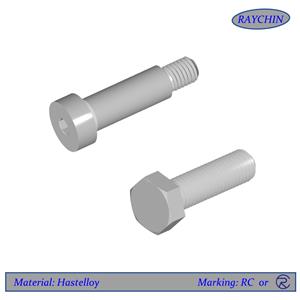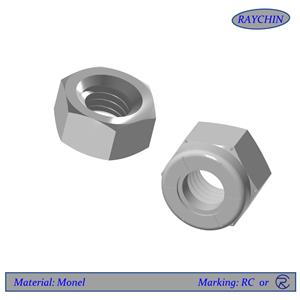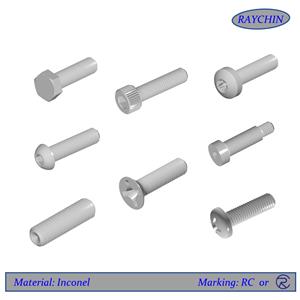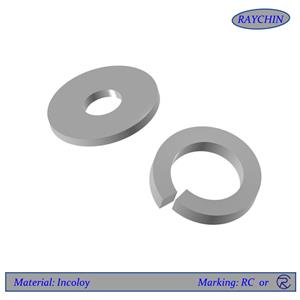Titanium fasteners are best known for being strong, lightweight, and corrosion resistant. They are critical to many industries including chlor alkali, marine, off-shore oil & gas, desalination, medical, and pulp and paper. Grade 2 and 5 are the most commonly used grades of titanium screws:
• Grade 2 (UNS R50400 / 3.7035) :Commercially pure titanium and the most common grade for screws.
• Grade 5 (UNS R56400 / 3.7165): Superior strength-to-weight ratio for a unique combination of corrosion and high strength.
Titanium Grade 2 / UNS R50400 / 3.7035 (Commercially Pure)
Unalloyed titanium; Commercially pure titanium is the most common grade of titanium utilized throughout industry due to its ease of availability and good properties.
Titanium Grade 2 Specifications: UNS R50400, ASTM B 348, AMS 4921, ASTM F 67, ISO 5832-2, EN 3.7035, ASTM F467 (Nuts), ASTM F468 (Bolts, Screws, Studs)
Titanium Grade 2 | Ti | Fe | O | C | N | H |
Min% | - | - | - | - | - | - |
Max% | Bal | 0.30 | 0.25 | 0.08 | 0.03 | 0.015 |
Titanium Grade 5 (Ti 6Al-4V) / UNS R56400 / 3.7165
Known as the “workhorse” of the titanium alloys, Ti 6Al-4V, or Grade 5 titanium, is 2x stronger than titanium grade 2. This alloy offers high strength and light weight, useful formability and high corrosion resistance. Ti 6AI-4V finds many uses in the aerospace, medical, marine and chemical processing industries.
Titanium Grade 5 Specifications: UNS R56400, EN 3.7165, ASTM - B265, B348, B381, B861, F467 and F468, AMS - 4911, 4928, 4935, 4965 and 4967, MIL-T - 9046 and - 9047, EN 3.7165, ASTM F467 (Nuts), ASTM F468 (Bolts, Screws, Studs)
Titanium Grade 5 | Ti | Al | V | Fe | O | C | N | H |
Min% | - | 5.5 | 3.5 | - | - | - | - | - |
Max% | Bal | 6.75 | 4.50 | 0.30 | 0.20 | 0.08 | 0.05 | 0.0150 |
Titanium Grade 7 (Ti-0.15Pd) / UNS R52400 / 3.7235
Grade 7 is the most corrosion resistant of all titanium alloys and is typically used in chemical processes and production equipment components. Similar to Grade 2, but with the addition of 0.12 to 0.25% palladium, Grade 7 has enhanced corrosion resistance to reducing acids and localized attack in hot halides.
Titanium Grade 7 Specifications: ASTM - B265, B337, B338, B348, B363, B381, B861 and B862, EN 3.7235, ASTM F467 (Nuts), ASTM F468 (Bolts, Screws, Studs)
Titanium Grade 7 | Ti | Fe | Pd | O | C | N | H |
Min% | - | - | 0.12 | - | - | - | - |
Max% | Bal | 0.30 | 0.25 | 0.25 | 0.08 | 0.03 | 0.0150 |
Titanium Grade 23 (TI 6AL-4V ELI) / UNSR56401 / 3.7165
Titanium grade 23 or TI 6AL-4V ELI is an Extra Low Intersticial grade. This grade is similar to Grade 5, but because of the low intersticials, its mechanical properties are enhanced. This ELI grade is often found in more demanding medical device applications as well as industrial applications.
Titanium Grade 23 Specifications: UNS R52400, ASTM - B265, B348, B363, B381, B861, B862 andF136, AMS - 4907, 4930 and 4956, EN 3.7165, ASTM F467 (Nuts), ASTM F468 (Bolts, Screws, Studs)
Titanium Grade 23 | Ti | Al | V | Fe | O | C | N | H |
Min% | - | 5.5 | 3.5 | - | - | - | - | - |
Max% | Bal | 6.50 | 4.50 | 0.25 | 0.13 | 0.08 | 0.03 | 0.0125 |




